Dentures – Downtown Washington, DC
Replace Teeth Easily with Full and Partial Dentures!

Missing teeth is far from only a cosmetic oral issue. In fact, there are many implications for your overall health as well if you don’t replace missing teeth, not just oral problems. Luckily, Dr. Wanda Davidson is not only capable of helping you keep teeth clean and healthy. She’s also completed an additional three years of post-graduate specialty education in prosthodontics. With this training, she’s fully qualified to provide custom-made full and partial dentures for patients with extensive tooth loss.
To get started rebuilding your new smile with Dr. Davidson, contact her office today to schedule an appointment!
Who’s a Good Candidate for Dentures?

Whether you lack one tooth or many, you likely qualify for dentures. The prosthetics don’t usually have strict requirements. Still, you should consult our dentists to settle the matter. They’ll perform an oral exam to see if dentures suit you. If they don’t, though, don’t worry – you can qualify later with preliminary dental work. You could also try one of our office’s other tooth replacement options. To learn more, just keep reading or call us for the details!
Effects of Missing Teeth

As you consider dentures, review tooth loss’ causes and effects first. A brief once-over will help you see how new teeth can help.
Overall, various things can cause people to lose teeth. Gum disease is a good example, as it erodes the tissue supporting your pearly whites. Another factor is tooth decay, which can rot teeth so much that they fall out or need pulling. A person could also have their teeth knocked out by an injury or accident.
In contrast, the effects of tooth loss are narrow yet severe. Perhaps the most notable is how it makes eating, speaking, and smiling hard. Being without teeth causes smile gaps as well, degrading your jawbone’s tissues. (This erosion can cause facial collapse if left untreated.) Worse yet, the same gaps can force your remaining teeth to tilt and fall out.
What Qualifies You for Dentures?

Tooth loss is the biggest qualifying factor for dentures. Even so, other elements are worth your attention.
For example, your oral health is a highly relevant factor. Dentures can’t work correctly if your mouth isn’t in decent shape. When your gums and jaw tissues are too weak, they can’t support the prosthetics properly. That said, sensitive or decayed teeth won’t disqualify you – dentures can replace such chompers!
The number of teeth lost is also essential. Based on how many are gone, you could get one of two possible dentures. The first is the partial model that only replaces a few teeth. In contrast, the second is the full denture – a kind that replaces all pearly whites along an arch.
Even your budget is a worthy consideration. After all, dentures are often the cheapest restorations available. That means they’re ideal for patients with limited funds.
Alternative Tooth-Replacement Options
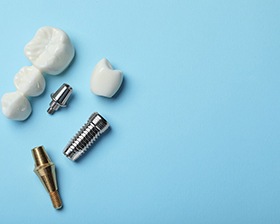
Of course, there are more options for those who aren’t good dentures candidates. Davidson Dental Associates has several other restoration choices. These include the following:
- Dental Bridges – A dental bridge needs nearby teeth for support and is normally cemented in place. (It secures itself with crowns fused to a pontic.) As such, it’s best used to replace one to four chompers at a time.
- Dental Implants – Dental implants are set in your jaw, unlike dentures or bridges. Consequently, they fuse with your jaw to act as substitute tooth roots. Once fused, then, they’re highly secure and permanent parts of your mouth. However, such traits do make implants a tad expensive.
How Can Missing Teeth Affect Your Oral and Overall Health?

It’s common for people to feel more self-conscious about smiling when they’re missing teeth, but did you know there are actually oral and systemic consequences that start to show if you don’t consider prosthetics? One of the most common side effects of tooth loss is a misaligned bite, which starts happening the moment teeth are extracted. The body naturally reacts to missing teeth by allowing existing teeth to shift into the open space in order to compensate. This quickly results in an uneven bite, increasing the risk of teeth grinding and enamel erosion, which is permanent.
Furthermore, missing teeth make it far more difficult to enjoy the foods you love, especially if those foods are tough, chewy or otherwise require a lot of biting force to consume. As a result, many people are unable to keep a balanced diet, which in the worse-case scenario can lead to malnutrition.
What are Full and Partial Dentures?
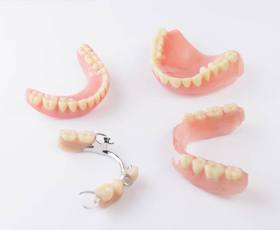
That’s where full and partial dentures come in. These dental prosthetics are designed to take up space in the mouth, make eating certain foods much easier, and give back the smile you’re used to! Full dentures are intended to replace the entire arch, while partial dentures work to replace consecutive teeth on either side of the mouth. Full dentures typically use an acrylic base and porcelain teeth, while partials usually rely on metal hooking systems.
What Does the Procedure for Dentures Entail?
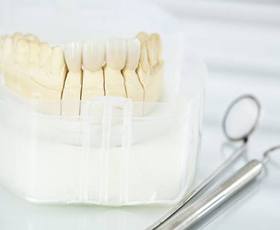
To make your denture, Dr. Davidson will take an impression of your mouth and use that information to measure its exact dimensions. Then, she’ll send that model to a dental lab where a trusted technician will begin putting together your prosthetic, including the base and the porcelain teeth. After cleaning, they’ll send it back to the office where you can have it fitted. If adjustments are needed, Dr. Davidson will make sure they’re addressed so your denture is as comfortable as possible.
What Are the Benefits of Dentures?

Dentures are a great solution to replacing teeth quickly and effectively. Without all of your pearly whites, you can end up struggling with different kinds of complications, such as eating and speaking comfortably. Not only will you regain your smile, but you’ll also enjoy other various advantages with your prosthetics. Here are several benefits of dentures you can expect to appreciate.
Psychological Benefits

If you’re missing some or all of your teeth, then you know how difficult it can be to feel comfortable enough to show your smile. Most people find it challenging to even engage in social interactions, as their self-esteem may have taken a dip. However, dentures can help renew your grin as well as provide a boost to your confidence so that you don’t have to worry about your appearance, speech, and chewing ability.
Clearer Enunciation

Did you know that tooth loss can make speaking more challenging? Whenever you’re missing teeth, you won’t be able to position your lips and tongue properly to pronounce certain words and sounds. Since dentures help restore your entire smile, they can help you enunciate clearly during a conversation. After a short adjustment period, it should feel more natural for you to speak.
Improves Nutrition

Other than impacting the way your smile looks, losing your teeth can also influence what you can eat. Certain foods that are tougher to chew, including fruits, veggies, and lean proteins, will need to be excluded from your diet. This can lead to further complications like indigestion and malnutrition. Dentures, however, can help improve your ability to chew, which can end up expanding your dietary choices.
Preserves Oral Health

When you lose teeth, your jawbone can begin to deteriorate and weaken. This is because there isn’t a tooth root present to stimulate proper bone growth, so your facial structure can begin to change. Additionally, your teeth can begin to shift out of place to fill in the gaps. You can easily avoid these issues by getting dentures, as these prosthetics can support your other natural teeth as well as bear some of the pressure of everyday chewing. This can end up minimizing any wear and tear on your remaining pearly whites.
Expands Opportunities

First impressions are crucial when it comes to meeting people, especially during job interviews or dates. Since your smile is one of the major things people will notice about you right off the bat, you can invest in dentures to replace any missing teeth for a natural-looking and reliable treatment. Not only will you feel more confident, but others may perceive you as more outgoing and competent, which can boost your opportunities in both your social and professional life.
If you’re tired of settling for soft foods and hiding your smile daily, contact our office to learn more about the process and benefits that full and partial dentures can offer!
Understanding the Cost of Dentures

One of the most important aspects of choosing the variety of tooth replacement that’s right for you is the cost of your treatment. It’s difficult to give you a complete idea of what dentures will cost you before meeting you in person, but if you’re thinking about prosthetics in comparison to other methods of repairing your smile, it may be helpful to keep these facts in mind.
Factors that Affect the Cost of Dentures

For one, you ought to know that every prosthetic is different, which means that the cost of your dentures can vary a bit from that of others. There are a couple of things to consider:
- Any treatments that need to be completed before you get your prosthetic, e.g., tooth extractions.
- The material used for the acrylic base.
- Whether you choose acrylic or porcelain for the replacement teeth.
It’s important to keep in mind that you shouldn’t necessarily default to the cheapest option. Picking a prosthetic comes down to a balance between quality and cost.
Are Implant Dentures More Expensive?

Implant dentures are prosthetics attached to metal posts that are surgically implanted into the jaw. This provides them with additional stability and durability, which denture patients usually tend to appreciate.
The implants do add to the cost of the prosthetic, but the fact that implant dentures have to be replaced much less often can potentially offset this cost.
Does Dental Insurance Cover Dentures?

Dentures are typically done for patients who could face adverse health consequences without a prosthetic to replace their teeth. That being the case, it’s common for dentures to be covered by a dental plan, though it’s always tough to guarantee anything for certain. We’ll help you to figure out what kind of coverage you can get when we meet you in person.
Other Options for Making Dentures Affordable

Even if you don’t have insurance, there are options available that can help you to get the care that you need without it. We frequently work with CareCredit, which is an organization that offers low-to-no interest financing terms for patients who need them.
With opportunities like this, you don’t have to stress about how you’re going to pay for your dentures. Keep this in mind if you’re concerned about how your finances will affect your ability to have a complete smile.
Dentures Aftercare

Now that you have your lifelike and durable dentures, you’ll need to take certain precautions to make the most of them. Though they’re designed to last a long time, it’s best to visit your dentist as well as keep them safe and clean at home. With our help, we’ll be able to detect any developing problems and address them before they can become bigger issues. Otherwise, here are several tips for caring for your dentures!
Removable Dentures
Remove After Eating

Once you’ve munched on a meal, it’s highly recommended to take them off afterward so you can rinse them. Not only will this get rid of any debris and food particles, but you’ll reduce your risk of bacteria growth. Be sure not to use hot water, as this can warp your prosthetics and result in them not fitting you properly.
Clean Your Prosthetics
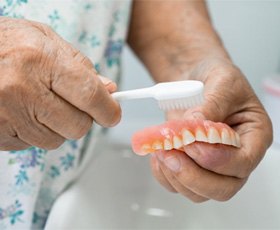
Whenever it’s time to clean your dentures, you don’t want to keep them in your mouth. By taking them completely off, you’ll have the chance to scrub underneath them where they meet your gums, as this is where bacteria can accumulate the most. Use a soft-bristled toothbrush to clean them, and use a tiny amount of hand soap or denture cleanser. Toothpaste, though effective for normal teeth, can be too abrasive for your prosthetics.
Keep Your Dentures Safe
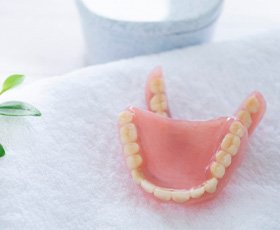
If you aren’t planning on wearing your dentures, make sure to store them in a protective container of water or denture cleansing solution. This will help keep them from drying out and losing their form. And while they’re durable, they aren’t invulnerable. While cleaning them, place a towel underneath to prevent them from breaking if you accidentally drop them. Also, keep them out of reach of small children or pets.
Remove Dentures When You Sleep
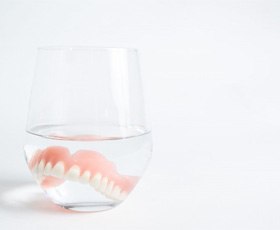
Before heading to bed, you’ll want to take your dentures out and soak them overnight. Firstly, this will keep them clean and bacteria-free until you wear them again. More importantly, you’ll allow your gums the chance to rest and receive the nutrients they need to stay healthy. Keeping your prosthetics on for too long can end up irritating your gum line, increasing the risk of gum/tongue plaque and even pneumonia.
Notice Changes
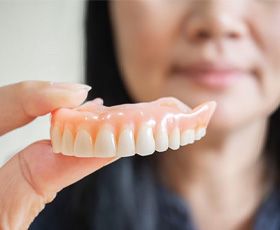
Always check the condition of your dentures in case there are any changes you’ll want to note. In some cases, your prosthetics can get worn down or damaged, or you may notice some issues around your mouth like sores, gum irritation, or even signs of infection. If you see any problems, notify your dentist right away so they can help alleviate the issue.
Denture FAQs
Should I Have All My Teeth Pulled to Get Dentures?
Repairing a damaged tooth is always a better option, when possible, instead of replacing it. Tooth extractions or any kind will only be recommended if it is deemed absolutely necessary, like when a tooth is too damaged to save due to extensive decay, a severe infection, or trauma that’s broken off most of the enamel. If all of the teeth in an arch are decayed or infected with gum disease, replacing them with dentures may end up being a more cost-effective option. During your consultation, all of your options will be explored to determine whether or not you would benefit from a tooth extraction or not.
Can I Sleep with My Dentures?
Dentists will generally recommend that you take your dentures out at night when you go to bed. When you first get your dentures, you may be told to keep them in your mouth for 24 hours, including sleep, but after this, you should be taking them out every evening. Wearing dentures restricts the circulation in your gums, leading to soft tissue irritation and potentially speeding up ridge resorption. When you take out your dentures, you’re giving your gums the chance to recover and get the nutrients they need throughout the night. The dark, moist space beneath your dentures is also an ideal place for bacteria to thrive, so sleeping with dentures has been associated with a higher risk of pneumonia. In the end, it is generally better that you take out your dentures before going to bed.
Will it Hurt to Get Dentures?
If you need to have teeth extracted before you get dentures, you’re likely to experience some discomfort after the oral surgery. Take your prescribed pain medication as directed and discomfort should improve in 3 to 5 days. When you first get your dentures, some minor irritation may occur as your mouth adjusts to the new appliance. The amount of time that this lasts depends on the person, but it can be several months. If pain persists, you should let us know. There could be an underlying issue that needs to be addressed.
Is It Hard to Talk with Dentures?
When you first get dentures, it takes time to get used to speaking with them. The exact amount of time it takes to get used to speaking with dentures varies from person to person, but the more you practice, the faster the adjustment process goes. You may have a lisp when you first get them due to changes in your palate, but this should go away over time.
Try speaking slowly and reading out loud to yourself in order to practice. Fast speech may come out muffled when you’re not used to talking with dentures, and some words may be more difficult to pronounce. Just like other activities and skills, practice makes perfect!
